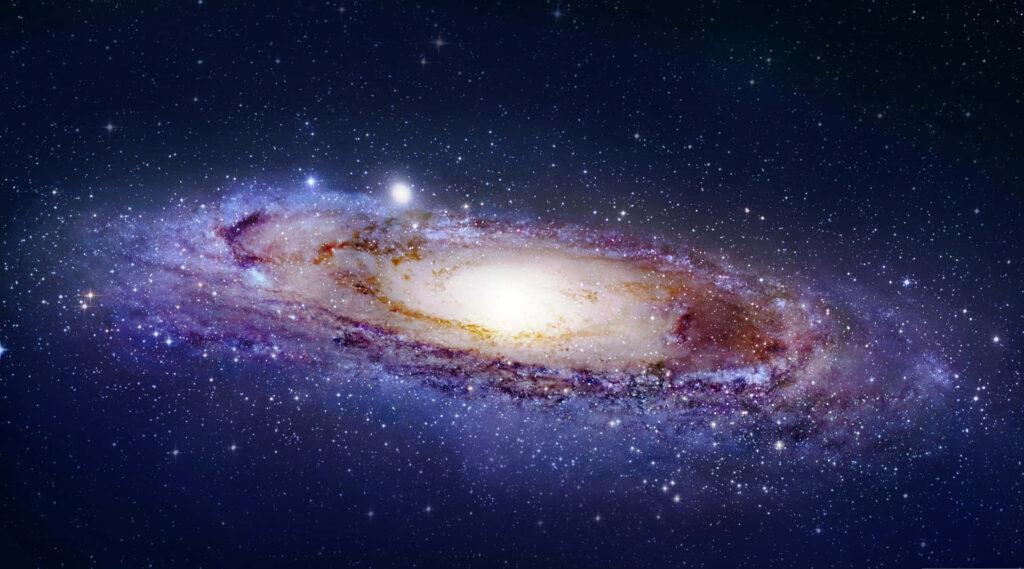What is your first reaction when you hear the word “physics”? Did you imagine working through difficult equations or memorizing formulas that seem to have no real use in life outside the physics classroom?
Many people come to the subject of physics with a bit of fear. But as you begin your exploration of this broad-ranging subject, you may soon come to realize that physics plays a much larger role in your life than you first thought, no matter your life goals or career choice.
Take a look at the image below. This is our Milky Way Galaxy, which contains billions of individual stars and Sun is one of them. There are billions of other galaxies like our Milky Way galaxy. These galaxies are bound with each other by the same force by which we are here bound with the Earth. The same gravity that causes the stars of a galaxy to rotate and revolve also causes water to flow over hydroelectric dams here on Earth. Tonight, take a moment to look up at the stars. The forces out there are the same as the ones here on Earth.

Through a study of physics, you may gain a greater understanding of the interconnectedness of everything we can see and know in this universe. We can say “Physics is the mother of all sciences”
Physics is the mother of all sciences
The assertion that physics is the “mother of all sciences” reflects the idea that physics has historically played a foundational and central role in the development of our understanding of the natural world. While it’s essential to recognize the contributions of other scientific disciplines, there are several reasons why physics is often considered the primordial science:
Fundamental Principles
Physics seeks to uncover the fundamental principles and laws that govern the behavior of the physical universe. These principles, such as Newton’s laws of motion, the laws of thermodynamics, and the theory of relativity, provide a framework for understanding a wide range of natural phenomena. Other sciences often build upon these fundamental principles.
Interdisciplinary Nature
Physics often serves as a bridge between different scientific disciplines. For example, it provides the foundation for fields like chemistry, which studies the interactions of atoms and molecules, and biology, which explores the physical processes within living organisms. Physics also contributes to areas like geology, astronomy, and environmental science.
Methodology
Physics emphasizes rigorous experimentation, mathematical modeling, and empirical observation. The scientific method, which is a fundamental approach to inquiry in all sciences, finds its roots in physics. This methodical approach to understanding the world has been adopted and adapted by other scientific fields.
Historical Development
Many of the earliest scientific discoveries were made in the field of physics. Thinkers like Galileo, Newton, and Einstein made groundbreaking contributions that laid the groundwork for subsequent scientific developments.
Unifying Principles
Physics often seeks to discover unifying principles that can explain diverse phenomena. For example, the laws of electromagnetism, as formulated by Maxwell, brought together electric and magnetic phenomena under a single framework. Such unifying principles have the potential to inspire and inform other scientific disciplines.
Exploration of the Cosmos
Physics extends its reach to explore the cosmos, from subatomic particles to the vastness of the universe. The study of astronomy, astrophysics, and cosmology is deeply rooted in physics and provides insights into the nature of the universe itself.
While physics has played a pivotal role in the development of science, we cannot underestimate the other branches of science. It’s important to emphasize that all scientific disciplines are essential and interdependent. Each branch of science contributes to our understanding of specific aspects of the natural world, and they often intersect and collaborate. The idea that physics is the “mother of all sciences” underscores its historical significance and foundational role but should not diminish the importance of other scientific fields.
If you love nature, you love physics. Yes! Because the word physics comes from Greek, and its actual meaning is nature.